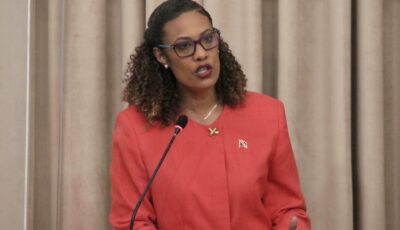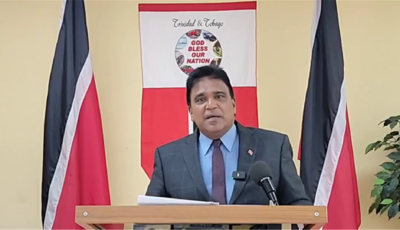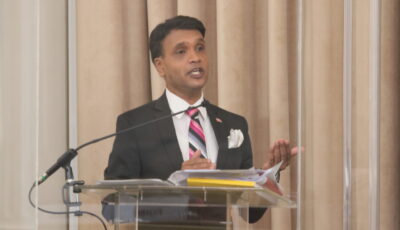HEADLINES
Commentary
Rowley strenuously objected to the construction of Penal-Debe UWI Campus
The media is reporting that the UWI Penal-Debe Campus, built during the People’s Partnership Administration continues to sit empty and has never
Posted On 30 Oct 2023
Blighted WGTL Project continues to haunt PNM
That World Gas-to-Liquids project is another of the many PNM scandals and failed projects which has cost taxpayers billions of dollars! And it is
Posted On 22 Jun 2023
Who financing Balisier House?
Ferdinand Ferreira, a founding member of the People’s National Movement (PNM), is quoted in the media as saying that the party has always
Posted On 03 Apr 2023
UNC SENATORS DEFENDED THE PARTY WELL TODAY
Today, the Opposition UNC Senators defended themselves and the Party well from the frivolous, anti-democratic motion by Senator Anthony Viera.
Posted On 22 Feb 2022
COVID WORKERS FIGHTING A WAR WITHOUT THEIR PROPER WEAPONS
We congratulate Kamla Persad-Bissessar on her success in forcing the Government to conduct an inquiry into the handling of covid. We take this
Posted On 20 Feb 2022
Letters
For fools rush in where angels fear to tread
The National Security Minister’s recent unrestrained language and conduct towards judges and unjustified criticisms of their judicial functions
Posted On 14 May 2023
Seek a fresh mandate
I recently read in one of the daily newspapers that Minister of National Security Fitzgerald Hinds said that 70% of society wants to see him
Posted On 27 Dec 2022
Don’t Blame God for Rowley’s Dotishness
Prime Minister Keith Rowley at the PNM convention on December 4, 2022, announces a National Day of Prayer. He said the country must come together
Posted On 16 Dec 2022
Keith Rowley has betrayed the sanctity of Parliament
Dear Editor, The revelation by the Commissioner of Police that the emails which Keith Rowley, then Opposition Leader read in our nations
Posted On 19 Jul 2019
T&T owes Kamla a debt of gratitude
Kamla Persad-Bissessar did what many were not expecting… she and her MPs voted unanimously with the Government to ensure passage of the Civil
Posted On 09 Apr 2019
Press Releases
Tancoo: Flooding imminent as Government fails to act
After a couple days of scattered “April showers” earlier this week, MP for Oropouche West, Dave Tancoo is again warning that severe flooding in
Posted On 06 Apr 2024
MP Khadijah Ameen wants justice for Kiss Driver’s death
Member of Parliament for St. Augustine, Ms. Khadijah Ameen is calling for justice for the death of Kiss delivery driver, Neil Ballai. Ballai was
Posted On 06 Apr 2024
UNC’s Persistent Pressure Forces Rowley Gov’t to Release 2024 EBC Report
On the heels of intense, consistent pressure from the UNC over their highly questionable refusal to lay the 2024 EBC Boundaries Report in
Posted On 06 Apr 2024
Moonilal: Hinds Fails Fire Service, Lives at Risk as Equipment Crumbles
The collapse of the Trinidad and Tobago Fire Services is another crushing indictment on the spectacularly failed Fitzgerald Hinds as Minister of
Posted On 05 Apr 2024
Padarath: Gov’t Electricity Rate Hike “Unbearable Burden”
Princes Town MP, Barry Padarath said that the contents of a report in yesterday’s Business Guardian headlined “RIC Recommends
Posted On 05 Apr 2024
Speeches
Tancoo: calls on Imbert to have a heart and indemnify the population
Today we come to you to shine some light on a very worrying development that has happened in the past few days. I am sure many of you saw or
Posted On 08 Sep 2021
Rowley’s Mad Power Grab in Tobago
My friends, we are seeing a government that is in freefall – in every single sector. Health, National Security, the business sector. And what
Posted On 16 Feb 2021
Presentation of UNC general election candidates 2020
T&T family! UNC family! It is my absolute pleasure to speak with you today, as we get ready for the sweeping victory that is to come on
Posted On 19 Jul 2020
Kamla: My vision is to build an intelligent nation
“ON THE BALLOT” UNC VIRTUAL MEETING (June 25, 2020) Introduction Good evening and thank you for joining us once again as we continue to set the
Posted On 26 Jun 2020
MNF – Kamla: There is hope
Introduction Good evening T&T! Good evening UNC family! It is good to be back! 2020 we are ready to rumble! Are you ready? Even though it’s
Posted On 11 Mar 2020
Copyright © - 2023 United National Congress







PNM people guilty of voter padding
It has taken more than a decade for the court to throw out, for want of prosecution, 28 charges of voter padding in the 2000 general election. The decision re-opens a politically driven chapter, now only dimly recalled, and also gives fresh impetus to concerns about the hopelessly slow and unproductive processes of Trinidad and Tobago justice.
When the voter-padding arrests were made and charges laid, the conduct of elections was a hot focus of political contestation. The People’s National Movement (PNM) made voter padding a cornerstone of its political campaign, with its spokespersons claiming with absolute certitude that the United National Congress (UNC) administration was plotting to undermine the democratic process and steal the general election. On that basis, both the public and the accused were entitled to expect timely court hearings.
It is thus scandalous that, only in April 2013, a magistrate finally dismissed the cases, with accused persons having been made to appear more than 30 times without prosecutors ever presenting any evidence. So it appears the proof which PNM leaders like Diego Martin North/East MP Colm Imbert claimed to have was never presented to the investigators, which means the voter-padding claims were, at best, a figment of someone’s imagination; or, at worst, a political strategy created by the PNM out of whole cloth to undermine the UNC.
In this regard, it is telling that, in 2007, two persons were in fact convicted of making a false declaration to the Elections and Boundaries Commission for the specific purpose of voter padding, but 52-year-old Judy Joseph and her 29-year-old daughter, Aleena, turned out to be PNM supporters. The PNM understandably never commented on that verdict, not even to warn their supporters against such acts, and it remains to be seen whether the party will now apologise to the 28 persons, most, if not all, of whom had never faced any court matter in their lives and who have for over a decade stood accused of trying to cheat in the electoral process.
It also remains to be satisfactorily explained by the judiciary—but will probably never be—why the magistrate’s decision on Monday to stop the rot could not have been taken, say, the 15th time those cases were called, maybe six years ago.
This is another clear-cut instance in which the administration of justice has been brought into disrepute—in this case, with the connivance of politicians whose claims should have been treated more sceptically. Not only have the accused persons been defamed, inconvenienced, put to expense and even traumatised, but the public would have also found cause to be cynical and even terminally distrustful of the administration of justice.
Express
Share this:
Like this:
About the Author
Section 34 was never bad law
The soldier bill
Upcoming Events
There are no upcoming events.
YouTube Channel
Follow Us
FACEBOOK
FACEBOOK
FACEBOOK
FACEBOOK
FACEBOOK
FACEBOOK
FACEBOOK
FACEBOOK
FACEBOOK
FACEBOOK
FACEBOOK